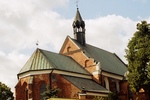Izbica Kujawska
| In this town Jakub Krzyżanowski used to live as a bachelor and, later, together with his family. He performed various functions in the manor house of the Skarbek family and, later the Czetwertyński family as well. In 1775 Izbica Kujawska Wincenty Fereriusz, the first son to the Krzyżanowski family, was born. |  |
In the 11th century Izbica belonged to the Awdaniec family and in the 12th century it became a centre of crafts services for nearby villages. It had been referred to as a town long before it was granted a town charter. It was granted the town charter by virtue of a document issued in 1394 by the king Władysław Jagiełlo in Nowy Korczyn. Under the reign of the king Kazimierz Jagiellończyk Izbica became the property of the Kretkowski family, which had the city in its possession until the end of the 16th century. Afterwards, the town was owned by the Latalski family, which had to deal with protestants coming to the town, the increasing Couter-Reformation movement, the Polish-Swedish wars in the 17th century, Lubomirski’s rebellion and wars fought at the beginning of the 18th century. The fire of 1735 destroyed the town. Owing to efforts of Jan (Skarbek coat of arms), the owner of Izbica since the half of the 18th century, the town began to develop and the fact that it was granted by the king August III a foundation charter in 1754 raised hopes for its further development. After the Second Partition of Poland in 1793 Izbica belonged to the Prussia. In 1800 the impoverished Skarbek family sold the town to the Zboiński family of Kikół. Next, the property was owned by General Augustyn Słubicki (Prus coat of arms), however, he was murdered in 1833 and upon this event Izbica ceased to exist as a private property. The town witnessed battles of the January Uprising (in the nearby villages such as Ignacego, Ciepliny and Brdów). In 1870 Izbica lost its town charter, in 1958 it was granted a status of a municipal housing estate and in 1973, i.e. after over one hundred years, Izbica regained its town charter.
There are several interesting historical buildings in the town. The Gothic parish church of the Assumption of the Blessed Virgin Mary dating back to the 15th century, to which a church-porch, vestry and belfry were attached in the 20th century. The interior of the church was decorated partly in the Baroque style. The Evangelical church of Izbica was erected in the neo-Gothic style in the years 1907-1909. It has been empty since the end of the war and since 1992 it has been a private property. Next to the church there is a well preserved small fragment of the cemetery. The synagogue of Izbica dates back to the half of the 19th century. After the Second World War it was used as a warehouse and furniture store and in 2000 it was given to the Jewish commune from Wrocław. The Nazi occupation did not spare the Jewish cemetery. Today, there is only a solitary pine tree standing on the hill, which reminds of the cemetery. The manor house in Izbica Kuj. is located in the western part of the city. It was rebuilt several times and since the half of the 18th century it has been the seat of successors of families in Izbica. Justyna Krzyżanowska, the future mother of Fryderyk Chopin, lived and worked there for 8 years. All that remained of the manor house is one of its entrance gates dating back to the 19th century and remains of the once splendid park.
Developed by: Andrzej Hermann
See other localities on the Fryderyk Chopin Route in the Kujawsko-Pomorskie Province


